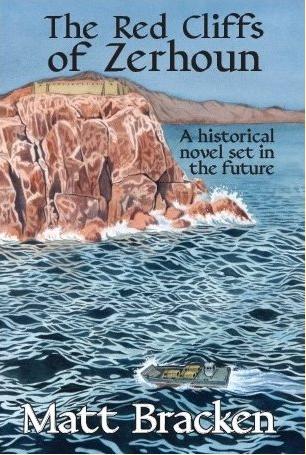Matt Bracken: The Red Cliffs Of Zerhoun
BY Herschel SmithOn order from Amazon.

On order from Amazon.

I have completed Archer Garrett’s The Western Front (I’m old school, and as with all books, I will simply not read an electronic version so I need the paperback). I have only one criticism about the book, and this isn’t such a big deal. There are a few typographical errors and sentence fragments, something I’m sure that Archer knows about and would correct with another printing. But this is easily overlooked given the engrossing nature of the story. The book begins at a rocking and rolling pace, but the context of the tale is given slightly later than the opening scenes.
First, Europe collapsed into the old hatreds and nationalist tendencies that had gripped it for centuries. It was hardly noticeable at first, bu then it began to accelerate exponentially. Next, Japan defaulted on several major obligations and spiraled into hyperinflation.
With the world quickly disintegrating around it, Turkey left NATO and reclaimed the entirelty of Cyprus as its own. It then invaded Bulgaria, Armenia, Syria and half of Iran. Iran’s remaining half had fallen into a bloody revolution that led to the slaughter of tens of thousands, and the rise of an even more ruthless regime than before. Israel was surrounded by complete and total chaos. They had nuclear weapons aimed in all directions, but particularly at Ankara. Russia began to englulf Georgia and the other Eastern bloc states. The world had fallen into complete chaos.
Then the inevitable happened, the tentacles that had been strangling the rest of the world finally spread across the Atlantic. The troubled banking system in the states was already in total disarray, artificially subsisting on fiat created at will. When the sovereign defaults of Europe began, it was all too much and too fast for the Federal Reserve to counter. The bank failures were announced daily. The FDIC’s insurance fund was emptied overnight. People were unable to withdraw any amount of money. Bank holidays were more common than days that they were actually open for business.
Then, in the third week of March, Black Thursday happened. The markets lost over half of their value on Wednesday and Thursday of that week. Some even believed it was part of a larger, coordinated, financial attack by a foreign government. Malicious or not, massive amounts of wealth vanished in a matter of hours. And so began the Greatest Depression’s American Spring.
Now, people were not even sure there would be an election. They were afraid the current administration would declare a state of emergency and simply forego a vote. If so, it was doubtful congress would intervene.
In the style of George R. R. Martin, switching from scene to scene and weaving a coordinated tale, we follow the lives of Barrett, Clayton, Jake, and others, including one very unsavory character, William.
It ends with quite a speech by the President, and then by the Governor of Texas, the two speeches at different locations and making very different claims. Without becoming a spoiler, there is no mean degree of surprise at the ending, and the times are even more dangerous than they were at the beginning of the tale.
This is very good dystopian fiction, but since it is so believable and salient, it is only dystopian in that these exact events have not happened. It sure seems that they could given the state of affairs today.
I highly recommend this book. If you believe like I do that this cannot go on forever, then you will want to ponder the circumstances Archer Garrett creates for the reader. How would you react? Who will be your friends and allies? How will you communicate? Are you prepared?
The Israel-Arab Reader, edited by Walter Laqueur and Barry Rubin (of GLORIA Center and MERIA). This updated 626 page tome goes through more than one hundred years of history in the Israeli-Arab conflict. Detailed, scholarly, and involved – but readable. It should be a volume in your library.


